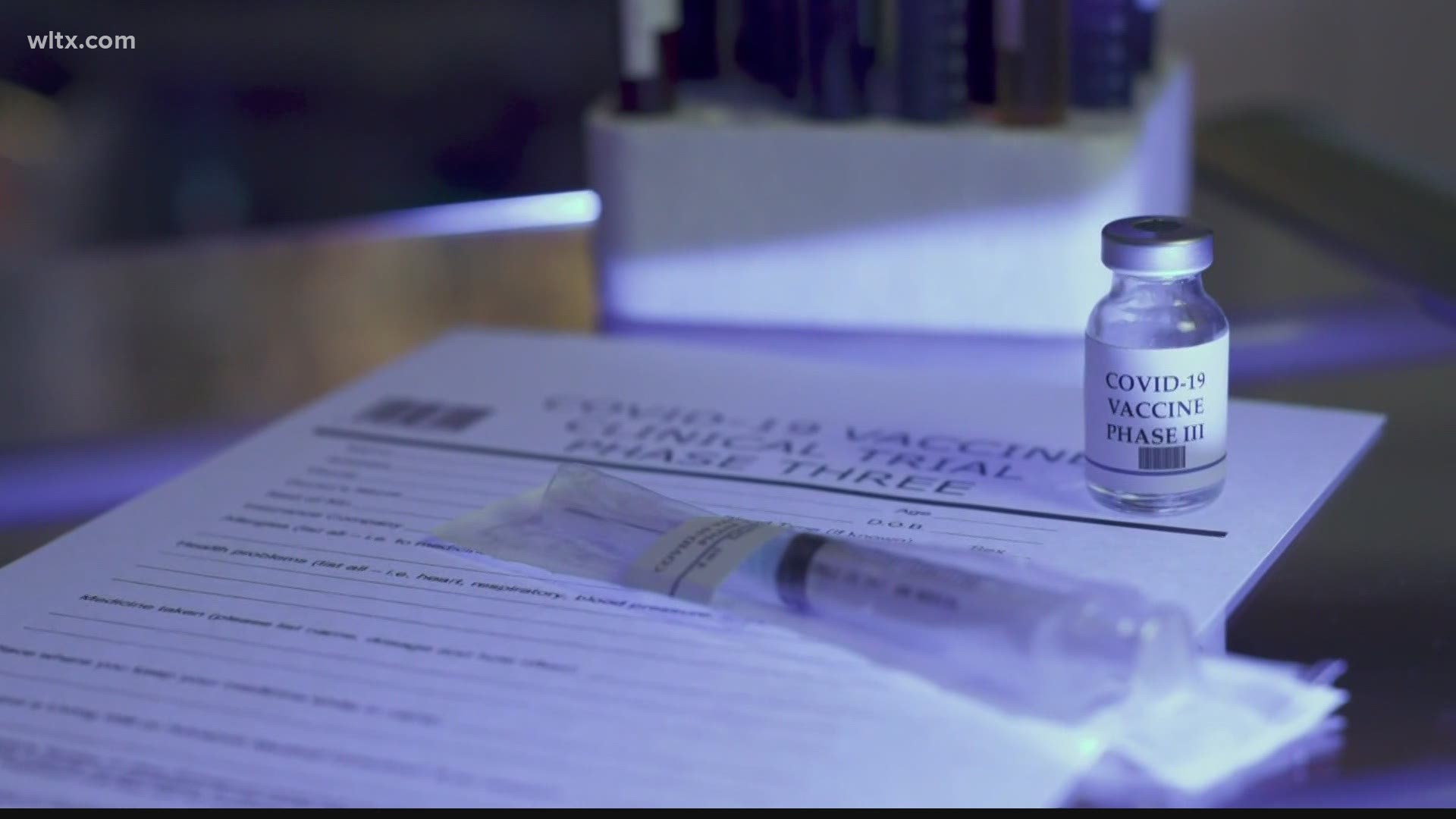COLUMBIA, S.C. — Leaders at South Carolina's health agency say the first shipment of second doses of the coronavirus vaccine have arrived in the state as the effort to inoculate millions in the state enters the new year.
State leaders said as of Monday morning, 43,227 South Carolinians had received the COVID19 vaccine. Those numbers primarily reflect the Pfizer-BioNTech vaccine that went to hospitals. The second vaccine, created by Moderna, went to CVS and Walgreens for distribution at nursing homes.
These doses are currently being given to those in phase 1A- including frontline workers in a health care setting. According to their website, South Carolina has been allocated over 129,675 first doses of the Pfizer vaccine and so far 33% of shots have been given. The national average at about 23%.
DHEC said they've now received the first shipment of the second dose of the Pfizer vaccine. Those will go this week to people who began receiving the vaccine in mid-December. (The Pfizer vaccine requires 21 days between doses; the Moderna vaccine requires 28 days.) The second dose is being managed by the federal government.
But this news hasn't satisfied some lawmakers, who have called out the agency for what they believe is a slow rollout. Gov. Henry McMaster demanded last week a frequently updated dashboard on the rollout.
Last week the agency called for patience as the vaccine was being rolled out. “We want South Carolinians to understand that everyone in our state who wants to be vaccinated against COVID19 will get their turn," said Dr. Brannon Traxler, interim public health director.
However, State Sen. Nikki Setzler of Lexington on Monday said it was "not acceptable" for South Carolinians to be patient when people are dying. "This battle is urgent, and we need an urgent response--the response provided by DHEC regarding the distribution of vaccines implies that they are acting in the opposite manner," Setzler said.
The following information is directly from DHEC about their rollout plan:
Progressing from the Initial Phase into Widespread Availability in Summer
The CDC’s Advisory Committee on Immunization Practices (ACIP) has provided guidance for categories of individuals to include in Phases 1a, 1b, and 1c. South Carolina is currently in Phase 1a and is vaccinating individuals in that phase per the SC COVID-19 Vaccine Advisory Committee’s recommendations based off of the ACIP guidance. The committee is currently working to translate the national Phase 1b and Phase 1c recommendations to action in South Carolina. The following outline provides an overview of the anticipated categories for each phase. This is subject to change at any time for many reasons, such as a change in federal guidance or in the SC COVID-19 Vaccine Advisory Committee’s recommendations for South Carolina.
Phase 1a
- Residents and staff of long-term care facilities
- Healthcare personnel (with initial focus on healthcare workers critical to the mission of preventing death), including:
- Persons performing direct medical care to suspected and/or confirmed COVID-19 patients: medical house staff (i.e., interns, residents, fellows), nurses, nurse’s aides, physical therapists (PT), physicians, physician assistants, respiratory therapists (RT), speech pathologists providing swallowing assessments during a patient’s infectious period, occupational therapists, translators with direct patient contact, students (medical, nursing, PT, RT)
- Ancillary staff directly interacting with suspected and/or confirmed COVID-19 patients: laboratory personnel handing potentially infectious specimens, phlebotomists, and radiology technicians
- Emergency room staff in the above categories who provide direct patient care who are at high risk of exposure to undiagnosed, suspected and/or confirmed COVID-19 patients
- Paid and volunteer medical first responders (EMS, fire department, and law enforcement personnel who provide emergency medical services as certified EMTs or paramedics) and hospital transport personnel in direct contact with suspected and/or confirmed COVID-19 patients
- Persons providing direct medical care in correctional facilities
- Persons providing direct medical care in dialysis and infusion centers
- Workers in outpatient medical settings treating persons with suspected or confirmed COVID-19 infection
- Workers in settings where monoclonal antibodies for COVID-19 infusions are given
- Home health and Hospice workers
- Public health nurses/personnel at risk for COVID-19 exposure
- Autopsy room staff, coroners, embalmers, and funeral home staff at risk of exposure to bodily fluids
- Dentists and dental hygienists and assistants
Phase 1b
- Persons aged 75 years and older (with or without underlying health conditions)
- Frontline essential workers (sectors included by ACIP include fire fighters, law enforcement officers, corrections officers, food and agricultural workers, United States Postal Service workers, manufacturing workers, grocery store workers, public transit workers, and those who work in the educational sector—teachers, support staff, and daycare workers)
Phase 1c
- Essential workers not included in Phase 1b (examples included by ACIP include people who work in transportation and logistics, food service, housing construction and finance, information technology, communications, energy, law, media, public safety, and public health staff who are non-frontline healthcare workers)
- Persons aged 65-74 years (with or without underlying health conditions)
- Persons aged 16-64 years with underlying health conditions that increase the risk for severe COVID-19 (more information to follow from the SC COVID-19 Vaccine Advisory Committee)
As vaccine supply increases, ACIP vaccination recommendations will expand to include more groups, in Phases 2 and possibly 3. The following outline provides an overview of estimated timeframes for each phase:
- Early Winter – Vaccinations for Phase 1a is anticipated to continue through February 2021.
- Late Winter to early Spring – Based on current CDC guidance, the state will move into Phase 1b once 70 percent of South Carolinians identified in Phase 1a have been vaccinated.
- Spring to Summer – Phase 2 is anticipated to begin in Spring 2021, with the vaccines expected to become available for the general public during the summer and fall of 2021.

